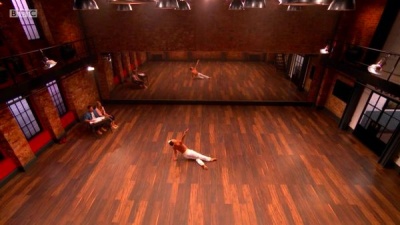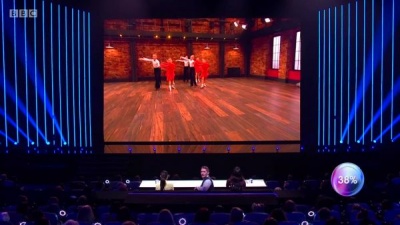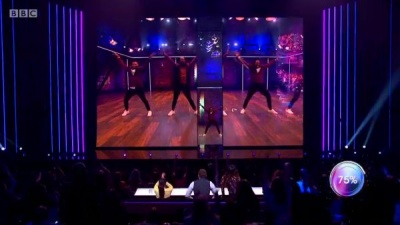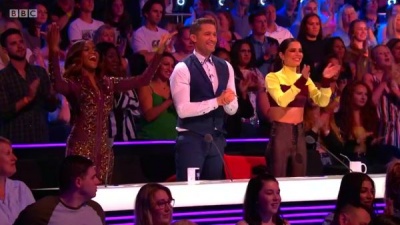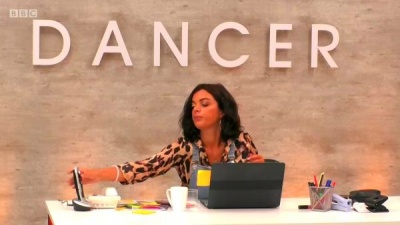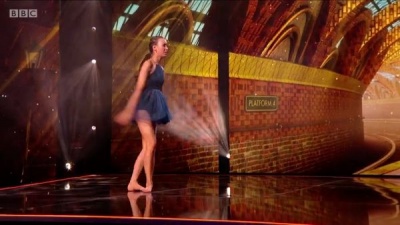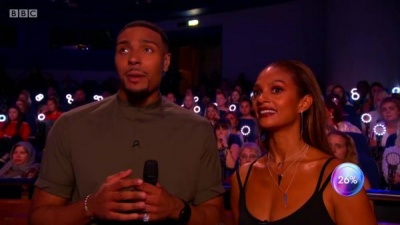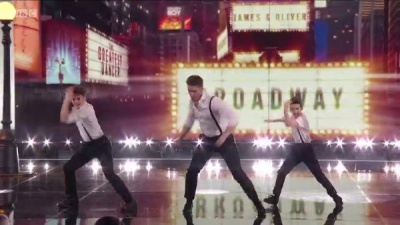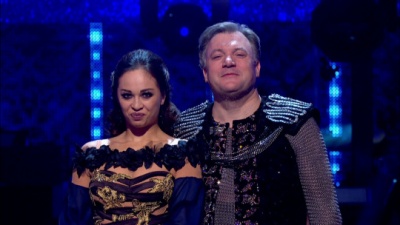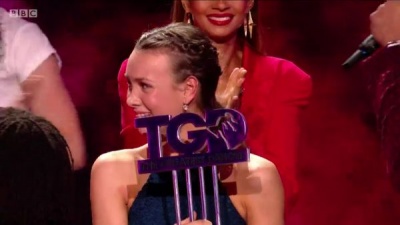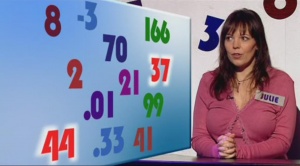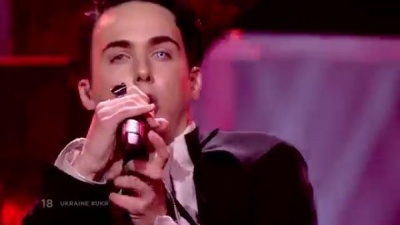Weaver's Week 2019-03-03
Last week | Weaver's Week Index | Next week
BBC1's new Saturday night talent show has failed to set the world on fire. What happened?
Contents |
The Greatest Dancer
Thames (part of Fremantle) and SyCo Entertainment for BBC1, 5 January – 23 February
Every talent show divides into three parts: the auditions, the cull, and the live shows. By tradition, these are unequal parts, and The Greatest Dancer upheld that tradition.
Auditions are the first phase. The competing acts took their place on a stage at the International Convention Centre in Birmingham. They performed a dance in their own style.
The Greatest Dancer is, officially, agnostic between all forms of dance. "Bollywood, ballet, jazz, jive, tap, tango – the lot," said a BBC press release. It's open to solo dancers, small groups, or larger ensembles – up to about a dozen people.
The mirror crack'd
Our auditions take place in a dance studio, with one of the walls covered by a mirror. On the other side of this mirror is the stage of ICC Hall 1, and a large audience. Video projection shows what's happening behind the mirror to the crowd in front.
By their seats, the audience have little keypads. Like what you see on stage? Push your button and say, "I like this"; a little ring will light up. When 75% of the audience say they like it, the mirror wall opens so we can see the dancer in the flesh. They will continue in the contest. Not enough people like it? The mirror stays closed, and that's that; no feedback from the "dance captains" and mentors.
We recognise this idea, it's from Keshet's Rising Star format. Rising Star was the hot idea in 2014, and sold around the world like hot cakes. Then other broadcasters got to make their versions, and unanimously found it to be a failure. Whatever made Rising Star a massive success on Israeli television didn't export anywhere else. ITV had the rights, and was going to make a series in 2015, but cancelled it and we got Stephen Mulhern's The Muppet Show instead.
Anyway. We mentioned "dance captains", the closest we get to a judging panel. At this stage, the three are advisors giving constructive criticism. The line-up is Oti Mabuse, a professional from Strictly Come Dancing. There's Matthew Morrison, from Glee and Broadway musicals. And there's Cheryl (previously Cheryl Tweedy, Cheryl Cole, Cheryl Fernandez-Versini, The Other One From Girls Aloud), whose qualification is more singing than dancing.
In the beginning, the auditions made for great television. We see the performers enter the building, and chill in a "reception" area. That's a novel idea, we've never seen anything like it before, and it provides a great hook. "Yes, we're Dancemania..." (and wipe to the filmed piece – if there's to be a filmed piece).
But reception areas are slightly formal, slightly aloof from the rest of society. They're a liminal space, at the tendrils of Simon Cowell's control. Out on the street, he is nothing. In his studio, Cowell rules. Here at reception, those worlds meet, and the performers might be put a little bit on edge.
Eventually, we see them perform. We cut to scenes in the dance studio, performing at the mirror, hoping to connect to the invisible crowd behind the mirror. We cut to scenes in the auditorium, watch lights twinkle on as people say, "Yes, I'd like to see that act again." We might hear some comments from the captains, or from the hosts as they cheer what's going on.
And then there's a resolution: the required mark is reached, the mirror cracks, and we see the performers in the flesh. Or the mark is not reached, and the mirror remains sealed. The losers slink away backstage: they might give a piece to camera, but we don't see them get any feedback from the judges, or from the captains.
Three episodes of this proved enough. It made "receptionist" Amelia famous for fifteen minutes, and it introduced us to the real stars of the show. We also saw the dancers who would feature in the live shows.
Live like no-one's watching
One episode of "callbacks" made up the cull section. Every act who had passed the audience check came back, and performed again. After they'd seen the talent, the captains chose which acts they'd mentor through the live shows.
This "callbacks" section is the one and only time where the captains get to shape the show. The initial selection of who would audition, that had been done by the production company, so as to ensure a good quality. The auditions were judged by the public, so only acts who made an instant emotional connection would progress in the contest. We knew the act was technically good, but could they hit people's hearts? Callbacks was the one time where technical quality counted for as much as emotional heft.
Up to this point, The Greatest Dancer could almost have run on autopilot. We had hosts – Alesha Dixon and Jordan Banjo – but could have replaced them with voiceovers and a taped explanation of the 75% requirement. The hosts came into their own on the live performance shows, Alesha worked well with the critics, and Jordan gelled with all in the green room backstage.
The format was the usual repeated voting, bottom two (or one, in the first episode) leaves the contest. To mix it up a little, the captains gave each of their contestants a prop to bring into their dance, so it couldn't all be freeform performances. And, for the final, the contestants performed with their captains: some elevated their acts, others may have tried to pilfer some limelight for themselves.
The last performances brought the show full circle, a re-interpretation of the initial audition dance, only this time without the video-projection mirror to distract the audience. It's a neat touch, and helped to show how much the dancers had learned from their time on the show.
The show was professional, glossy, and slick. Nothing was left to chance, and nothing went wrong. It had big name talents – Nile Rodgers composed the music, Florian Wieder was involved in stage design, Bob Warans was props buyer. These are masters of their respective arts, as Simon Cowell is master of his art.
Dance like everyone's watching
Throughout the series, The Greatest Dancer concentrated on dance as entertainment. What made Ellie so brilliant? What techniques was she using, how does she bring about an emotional response from the audience? How might other dancers become as good as the champion Ellie? These are difficult questions, and other shows would at least acknowledge them them. The Greatest Dancer would not even go there.
Other successful dance shows – Strictly Come Dancing, CBBC's drama The Next Step and its spin off contest – will glance at technique and hard work and persistence. The connection to the audience doesn't just magic into being, it comes from diligent practice and self-criticism and slow improvement.
A few years ago on Strictly, Ed Balls took us on a journey, from mediocre all the way up to poor, and the viewers went along with him. He was rewarded for diligent practice and self-criticism and slow improvement, right up to the point where his lack of skill simply wasn't good enough. The Next Step shows how competition amongst dancers can raise everyone's standards – and can cause friendships to fracture.
The Greatest Dancer ignores all the struggle, treats the hard work as a given. It's exactly what we'd expect from a Simon Cowell production. When we last reviewed a new SyCo format – Food Glorious Food in 2013 – we noted how Simon Cowell has inculcated one thing into the DNA of his company: whenever possible, go for the emotional angle.
Nothing has changed. The master showman still has exactly one button to push. Go straight for the heart, bypass any critical faculties and concentrate on emotions. It makes for shows that appeal to people who like to *feel* rather than *think*.
This emotional pull works. The Greatest Dancer was an up-and-down rollercoaster, and we understand almost all of the decisions on the show. Might not agree with them, but we get where the audience were coming from, and how they might have been guided there. But for all its technical brilliance, for all its emotional punch, this column found The Greatest Dancer to be unsatisfying. We got more from the short-lived So You Think You Can Dance, which had both quality dancing and a satisfying critique.
There will be another series of The Greatest Dancer, and that came as something of a surprise. Viewing figures had been adequate, press reaction tended to the negative. But what's the alternative? What else can BBC1 use to differentiate itself from ITV and The Voice and its spinning chairs? This ticks the boxes, it works for BBC1, and right now that's enough.
Mastermind Update
Heats 16-18
Oliver Forrest won on 8 February, taking the Films of Wes Anderson, and notched up 26 points in his win. The specialist round was almost flawless, general knowledge fell in his favour. Not so for Lesley Bowen, who knew Richard III, but didn't get the general knowledge and fell a few points adrift. Rachel Charman (novels of Nancy Mitford) and Phil Robinson (England rugby since 1945) also produced a pair of excellent rounds, and anyone could have won some other heats.
Pat Williamson was victorious on 15 February, answering on the history of Manchester and Salford. This game was won on general knowledge – Pat scored 11 specialist and 15 general knowledge, to a 14 and 11 from Jodie Underhay. Jodie's specialist was Best Picture Oscar winners 1928-70. The other players were Sarah Skelton (Joseph Bazalgette), and Nifthy Jamaldeen (Greek mythology).
Ian Orris won on 22 February, with Karl Gustav Mannerheim the specialist. A little ahead on that round, a little ahead on the general knowledge round, and two small wins make for a 28 total and one to watch in the next phase. Keshava Guha (novels of Penelope Fitzgerald) knocked on the door with 26, and there were scores over 20 for Lynne Francis (children of Queen Victoria) and Gaetana Trippetti (The Doors).
No match on 1 March, various sports filled the night.
This Week and Next
Congratulations to Julie from Durham, winner of Best Actor On The Planet at this week's Oscer awards. Julie won the award for the part of "Olivia Colman" in Numberwang!, a musical based on the parlour game.
Incredible scenes on The Chase this week. On Tuesday, Paul Sinha caught a target of 22, and gave up a pushback, and still had five seconds to spare. That's quite amazing. That's surely the best performance we'll see this month.
"Hold my blended fish eyes," said Anne Hegerty. On Wednesday, the governess knocked off a target of 20 without getting a question wrong. The team didn't get any pushbacks wrong, because they didn't get any pushbacks.
Taking my vampire home. NTU will not send an entry to this year's Senior Eurovision Song Contest. The public selection last weekend chose Maruv to perform under the "Ukraine" name. She has previously performed in Russia, and has further engagements booked in the coming weeks.
But art doesn't happen in a vacuum. Forces loyal to Russia still occupy territory administered by the government in Kyiv. The government objected to an artist who wants to bring art to the world, the government wants to stir up patriotic fervour which it hopes will be to its benefit.
The government leant on the broadcaster, and insisted that Maruv not perform in Russia. The performer declined, and all of the runners-up in the contest also declined the opportunity to perform. As a result, "Ukraine" will not be represented in Tel Aviv.
This is a terribly sad state of affairs, and not least because the entry "Siren song (bang!)" looked to be a strong contender. While the EBU might like to pretend that it can put its competition above politics, those of us who live in the real world know that it's not possible. Nationalism will always creep in, we can only ever act to lessen its dead weight.
We look forward to seeing NTU's next entry at Junior Eurovision in November.
BARB ratings in the week to 17 February.
- Call the Midwife is still television's top show (BBC1, Mon, 9.1m). Dancing on Ice remains the top game (ITV, Sun, 5.6m).
- The Voice is only just behind (ITV, Sat, 5.55m). Masterchef returns to top BBC1's list (Mon, 4.9m). The Greatest Dancer (Sat) struggling on 4.15m, only just beating Pointless Celebrities (4.05m). Brightest Family (ITV, Wed, 3.2m) came ahead of Small Fortune (ITV, Sat, 2.8m).
- Sewing Bee was back on BBC2 and picked up 3.8m. Only Connect (2.33m) continued ahead of University Challenge (2.3m), with 1.65m for QI. 730,000 looks a low figure for Insert Name Here, but it's OK for the slot.
- Channel 4's Hunted finished with 2.55m, slightly behind the series' opening episode. Bad publicity from people who watched it live seemed to hurt catchup audiences. Catsdown scored 1.8m.
- Top digital shows: Hell's Kitchen (ITV2, Tue, 545,000), Hypothetical (Dave, Wed, 540,000), and Coach Trip (E4, Thu, 415,000). The new Portrait Artist of the Year brought 285,000 to Artsworld.
Lots of new shows this week. Tonight, Côr Cymru is back on S4C, and Race Across the World starts on BBC2.
Hate the show, not the girl: Channel 5 strips The Bachelor. Hate the host, not the show: ITV strips Who Wants to be a Millionaire.
There's competitive cosmetics on Glow Up (BBC3 on BBC1, Wed), and competitive fashioning on Dim I'w Wisgo (S4C, Fri). An underground clue hunt for Y Siambr (S4C, Thu), but if that's too difficult we also have Al Murray's Great British Pub Quiz (Quest, Thu).
Next Saturday features the return of Fferm Ffactor Y Selebs (S4C), and there's a sitcoms edition of Pointless Celebrities.
Photo credits: Thames / SyCo, BBC, TVP/EBU.
To have Weaver's Week emailed to you on publication day, receive our exclusive TV roundup of the game shows in the week ahead, and chat to other ukgameshows.com readers, sign up to our Yahoo! Group.


